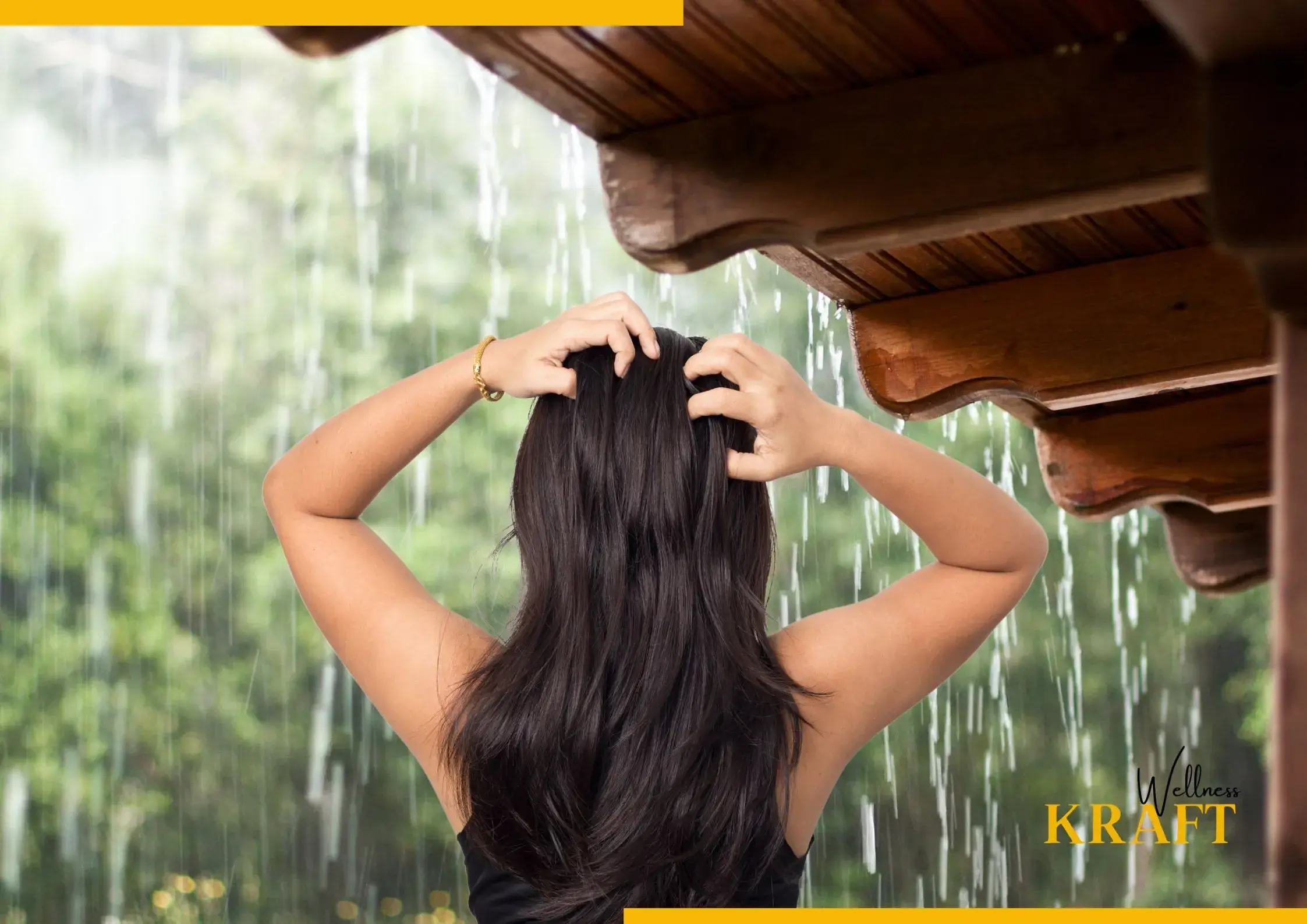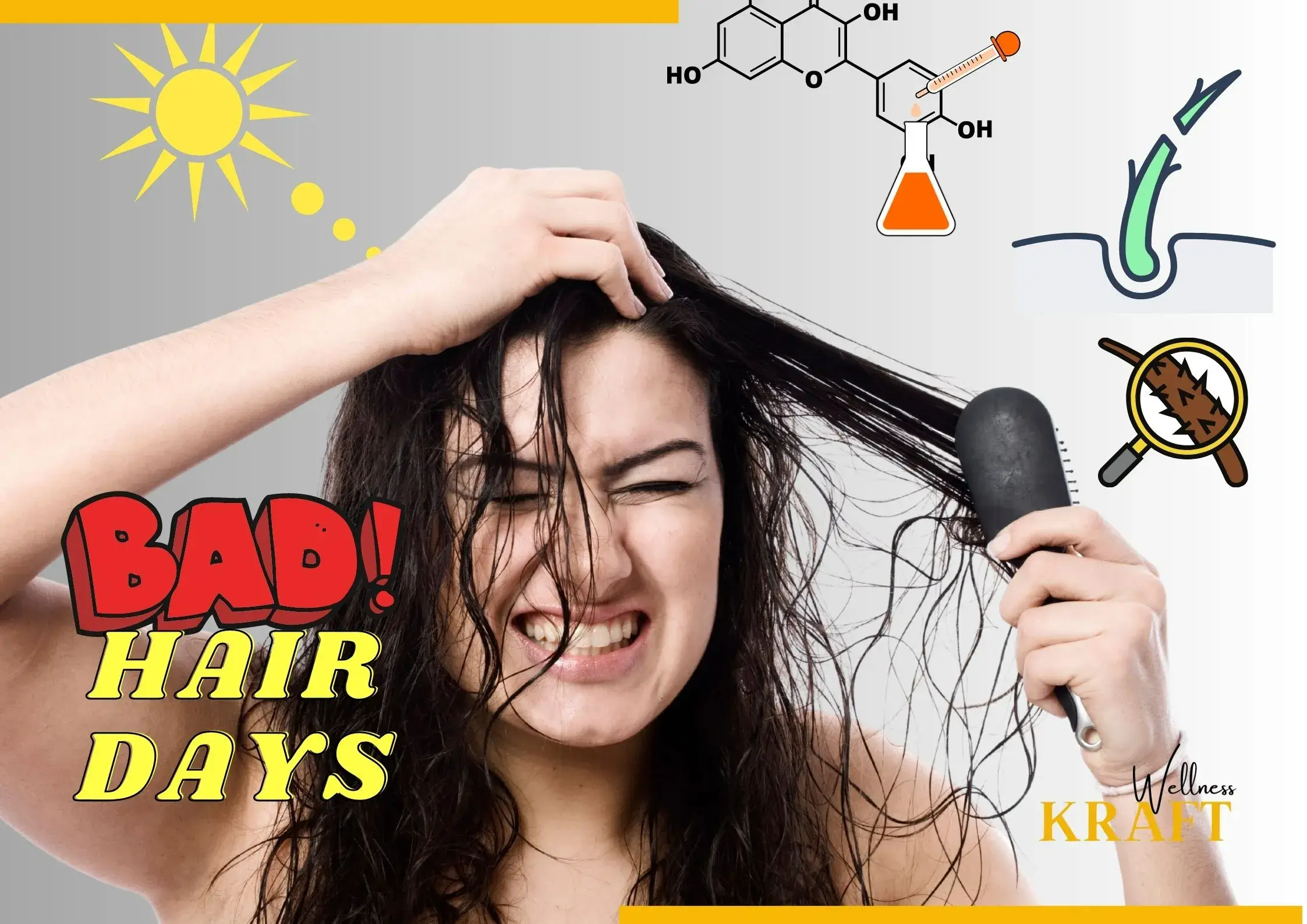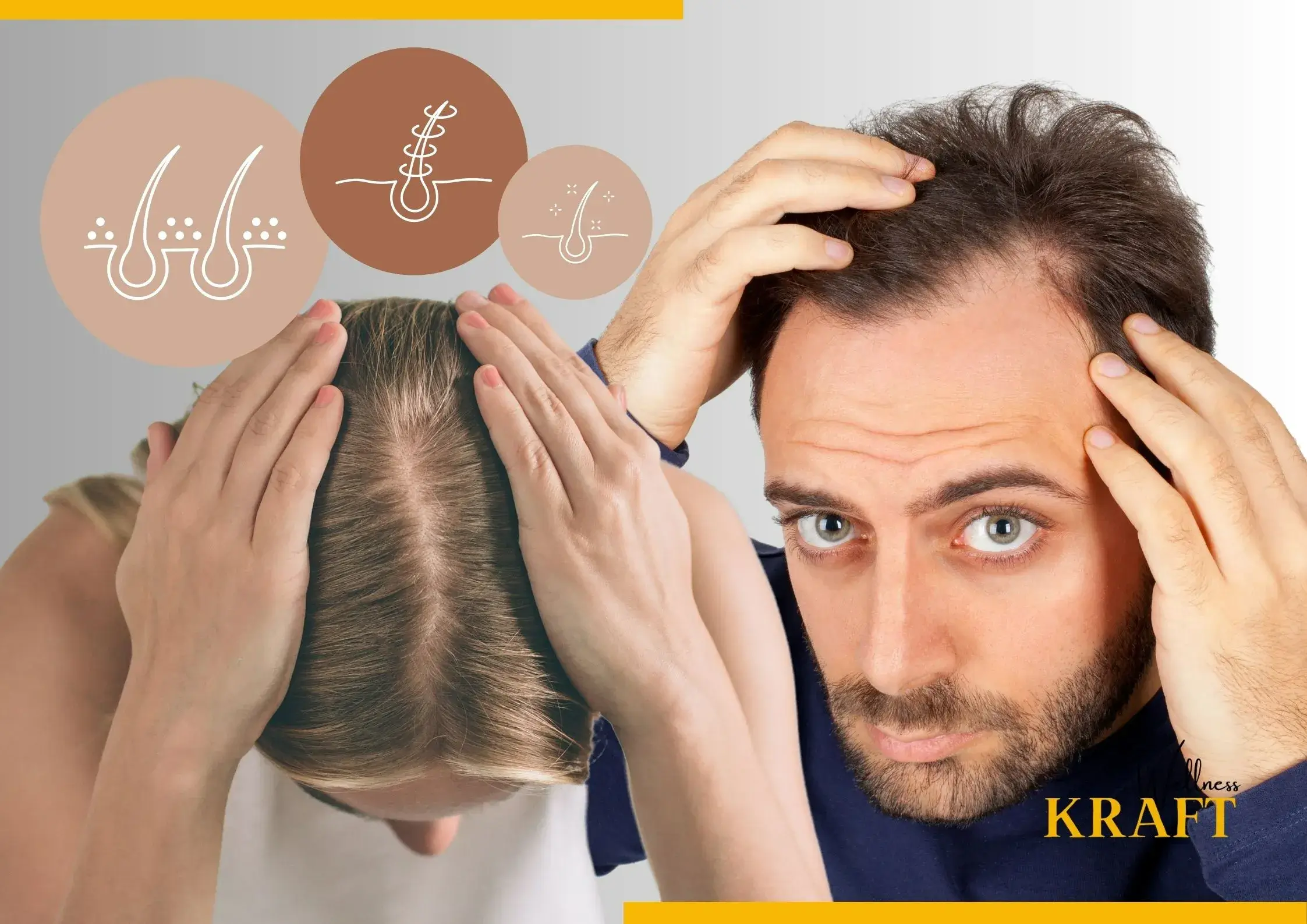Avoid bad hair days this monsoon season. Optimize your hair care regimen for better results. – Wellness Kraft
Table of Contents
Introduction
I have personal experience with the challenges and damage that can be inflicted on hair during the monsoon season. The high humidity and frequent rain can mess up even healthy hair. Here is my personal story of dealing with monsoon damage to my hair:
Hair Care During Monsoon
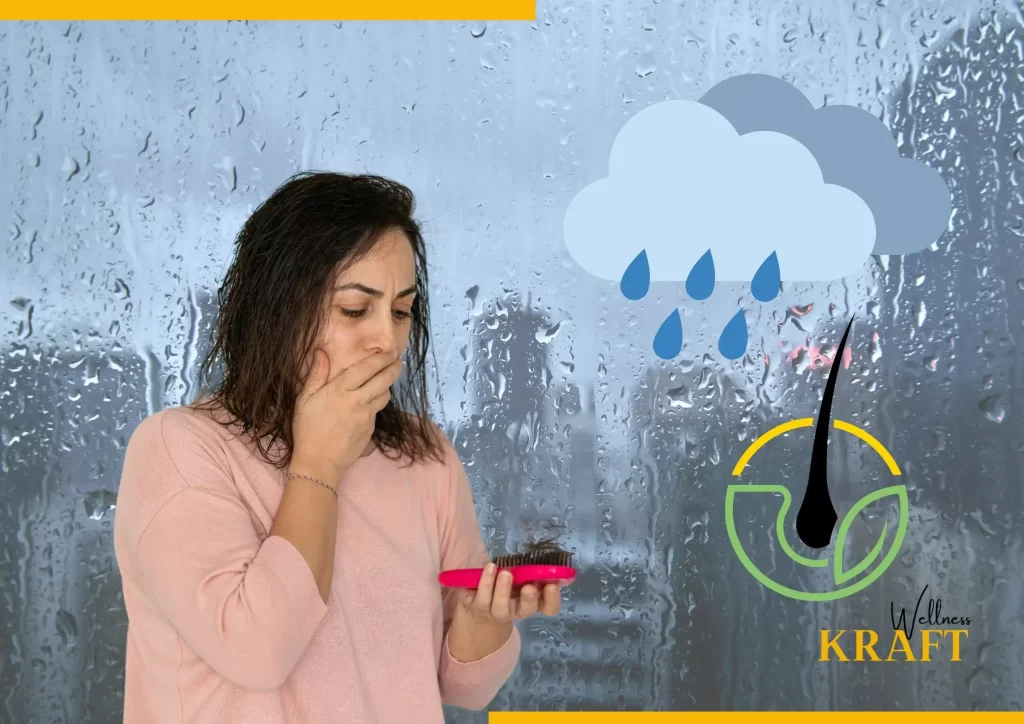
As the rain started to fall more often, I noticed that my hair was losing its shine and becoming dull and limp. The air had too much moisture, which made my hair frizzy and hard to control and style. No matter how hard I tried to style my hair, it always fell flat a few minutes after I stepped outside.
Increased hair loss was another issue I experienced. My hair strands were weakened by the mix of rainwater and humidity, which led to more breakage and shedding. Every time I ran my toothbrush through my hair, it was upsetting to see that it was full of hair.
During the monsoon season, dandruff was a constant problem. The dampness and humidity produced the ideal environment for the scalp’s natural yeast to grow, which resulted in flakiness and itchiness. I found that scratching my scalp on a regular basis only made the issue worse.
To combat these issues, I opted for a hair care routine designed especially for the monsoon season. To clear any dirt, extra oil, or product buildup, I made sure to cleanse my hair and scalp on a regular basis with a mild shampoo. I also added a nourishing conditioner to my routine to give my hair the moisture and hydration it needed.
To control frizz, I started using anti-frizz serums and leave-in conditioners, which helped smooth down the cuticles and keep my hair manageable. To minimize further damage, I also avoided using heat styling tools as much as possible and let my hair dry naturally.
I paid attention to my diet and ensured that I was getting a balanced intake of nutrients, including vitamins and minerals essential for healthy hair growth, to address the issue of hair fall. To strengthen my hair from the inside, I also took the hair care supplements my dermatologist suggested.
I started using homemade remedies to get rid of dandruff in addition to my usual hair care routine. The itchiness and flakiness of the scalp were successfully reduced by a mixture of lemon juice and coconut oil. Before rinsing the mixture off, I would gently massage it into my scalp and let it sit for a while. This helped me restore balance to my scalp and keep dandruff under control.
Despite the challenges, I found that with consistent care and the right products, I could minimize the damage brought on by the monsoon season. I was able to restore my hair’s health and keep it looking its best, even during the rainy season, by taking a proactive approach and being aware of my hair’s needs.
Overall, my experience with hair damage during the monsoon season taught me how important it is to change my hair care routine to address the specific challenges brought on by the weather. I was able to protect my hair and maintain its health throughout this difficult time of the year by understanding the effects of humidity, moisture, and other factors.
My Hair Care During Monsoon How It Worked
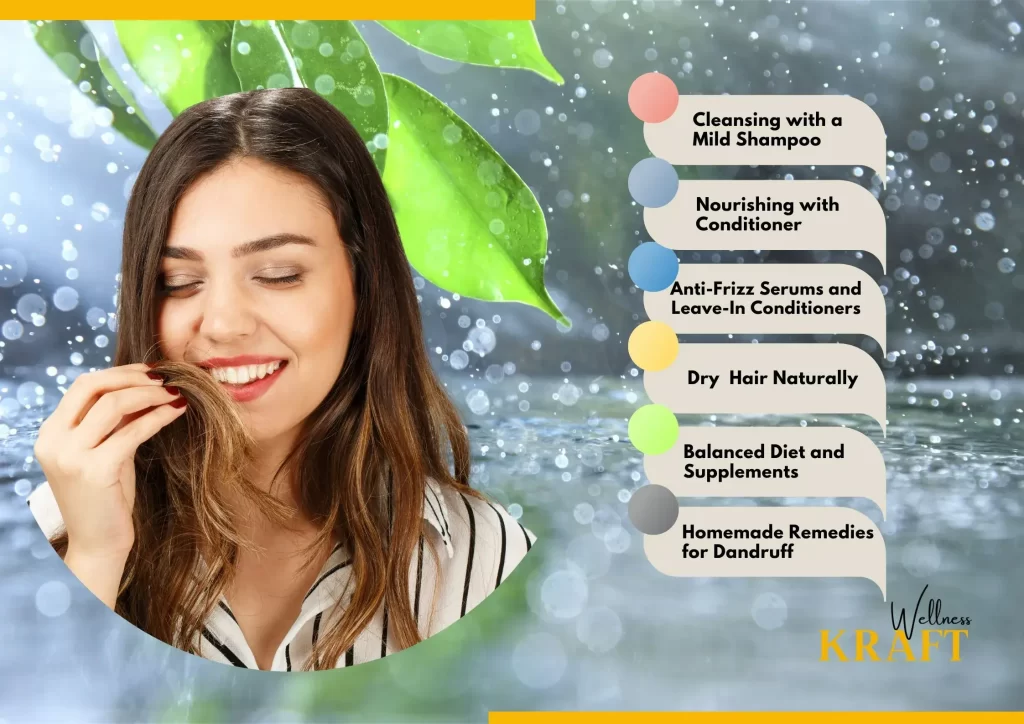
To address the damage brought on by the weather during the monsoon season, I adhered to a specific hair care routine. Here is the routine I applied and how it helped me:
1) Cleansing with a Mild Shampoo:
I always made sure to use a mild shampoo to cleanse my hair and scalp. This helped get rid of any dirt, sweat, or buildup of products that had happened because of the hot weather. It helped prevent issues like dandruff by keeping my scalp clean. The mild shampoo was gentle enough to not strip my hair of its natural oils, helping to maintain its moisture balance.
2) Nourishing with Conditioner:
After shampooing my hair, I applied a nourishing conditioner, paying special attention to the middle and ends. The conditioner helped restore moisture and hydration to the hair, which was dry from the monsoon season. I was able to reduce frizz, and it made my hair smoother and more manageable. Before completely rinsing off the conditioner, I left it on for a few minutes.
3) Anti-Frizz Serums and Leave-In Conditioners:
To stop frizz, I added anti-frizz serums and leave-in conditioners to my hair care routine. These products helped smooth the cuticles of the hair, which cut down on frizz . They also added a layer of moisture and protection, keeping my hair manageable all day. On damp hair, I applied a small amount of serum or leave-in conditioner and spread it evenly from the middle to the ends.
4) Dry Hair Naturally:
I limited my use of heat styling tools like blow dryers, straighteners, and curling irons during the monsoon season. Hair that has already been damaged by moisture and humidity can be further damaged by excessive heat. Instead, whenever possible, I opt to let my hair dry naturally. This helped reduce the risk of heat damage and improve the health of my hair.
5) Balanced Diet and Supplements:
I paid close attention to my diet and health and ensured that I got a good mix of nutrients that are good for hair health. Fruits, veggies, lean meats, and nuts are examples of foods rich in vitamins, minerals, and proteins. Also, I used hair care vitamins that my dermatologist suggested. These pills gave my hair extra nourishment from the inside, which helped it stay strong and grow.
6) Homemade Remedies for Dandruff:
I used homemade remedies in addition to my normal hair care routine to get rid of dandruff. A mixture of lemon juice and coconut oil was one successful treatment. Before rinsing the mixture off, I gently massaged it into my scalp and let it sit for some time. This helped to reduce itchiness and flakiness on the scalp, keeping dandruff under control and maintaining a healthy scalp environment.
The health of my hair was positively impacted by following this sitting routine during the monsoon season. The conditioner gave much-needed moisture, while the gentle shampoo cleansed without removing essential oils. The anti-frizz serums and leave-in conditioners help control frizz while minimizing heat styling damage. My hair was nourished from within by a healthy diet and supplements, and the home remedies for dandruff successfully addressed the issue.
I was able to protect my hair, enhance its appearance, and maintain its health during this time of increased humidity and moisture by sticking to this routine and modifying it to fit the challenges of the monsoon season.
Dealing With A Wet And Itchy Scalp
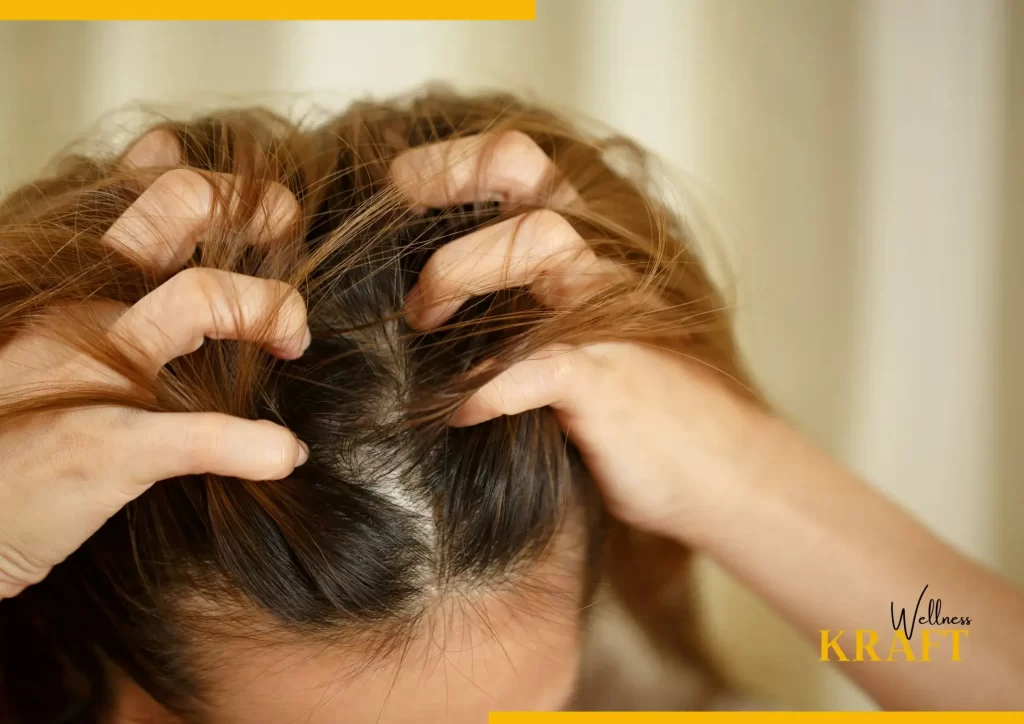
Dealing with a wet and itchy scalp during the monsoon season can be very annoying. In order to treat these issues, I tried a variety of treatments, including both home remedies and professional treatments. I used the following remedies:
A) Home Remedies:
1) Apple Cider Vinegar Rinse:
I made a mixture of apple cider vinegar and water and used it as a final rinse after shampooing. The acidic features of apple cider vinegar helped restore the pH balance of my scalp, reducing itchiness and retaining excess moisture.
2) Aloe Vera Gel:
Before rinsing it off, I applied fresh aloe vera gel straight to my scalp and left it on for about 30 minutes. Aloe vera has soothing and moisturizing qualities that help relieve itchiness and maintain scalp hydration.
3) Tea Tree Oil Scalp Massage:
I mixed a few drops of tea tree oil with a carrier oil (like coconut oil) and massaged it gently into my scalp. Tea tree oil has antimicrobial properties that can stop fungus or bacteria from growing on the scalp, reducing itchiness and controlling scalp moisture.
4) Neem Water Rinse:
I put neem leaves in water and boiled them. Then I let the mixture cool and drained it. After shampooing, I used this neem water to rinse my scalp. Neem has antibacterial and antifungal qualities that help reduce scalp itchiness and provide extra moisture.
B) Professionals Treatments :
1) Scalp Treatment at a Salon:
I went to a salon to get a professional scalp treatment made just for the monsoon season. The treatment involved carefully cleaning the scalp, exfoliating to get rid of dead skin cells, and applying special serums or masks to restore scalp health and balance moisture levels.
2) Dermatologist Consultation:
I sought professional advice from a dermatologist if the scalp issues continued or got worse. My scalp was thoroughly examined by the dermatologist, who then recommended medicated shampoos, creams, or treatments based on the root cause of the itchiness and excess moisture.
Although these remedies helped me with my scalp issues during the monsoon season, everyone’s results may be different. It’s always a good idea to talk to a health care professional or dermatologist for individualized help and suggestions based on your unique scalp condition.
How to Avoid Lice or Nits During The Monsoon
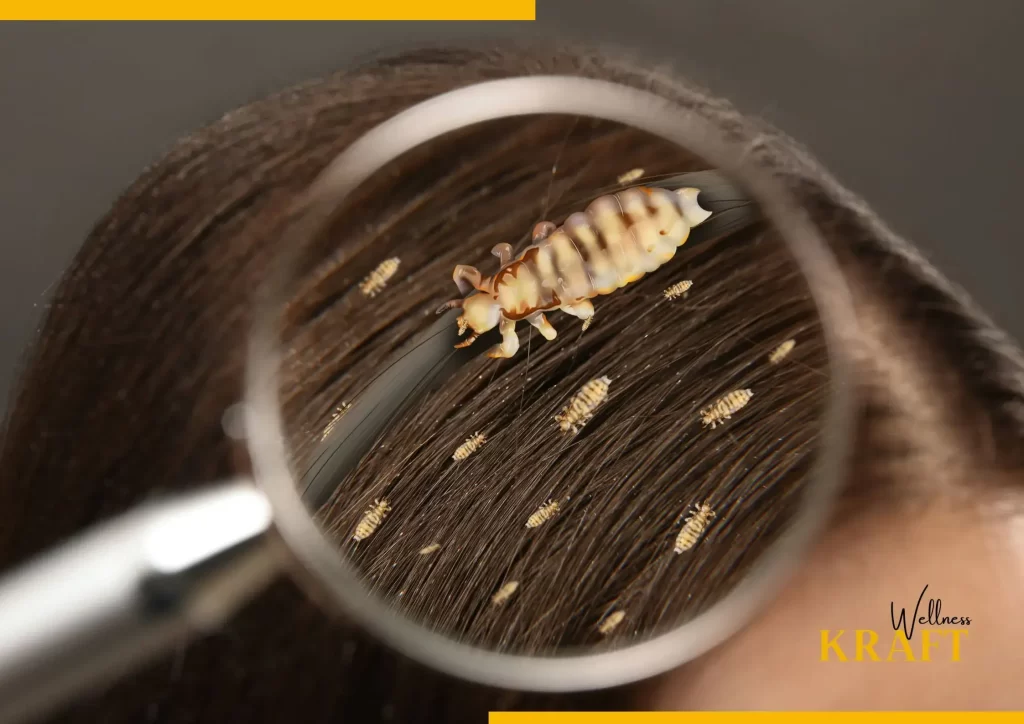
-Due to conditions like higher humidity and close contact with other people in damp environments, the risk of lice infestation can go up during the monsoon season. Here are some steps you can take to avoid getting lice during the monsoon:
-Keep up with your personal cleanliness. Wash your hair regularly with a mild shampoo and keep it clean. One of the most important things you can do to stop a lice infestation is to keep your home clean.
-Don’t share personal items like combs, brushes, hair accessories, hats, towels, or other things that come in contact with hair. Lice can easily spread through these things, so it’s important to keep them separate from your personal goods.
-Keep your hair tied up or braided, especially when you’re going out or will be in close contact with other people. This makes it less likely that lice will move from one person’s hair to another.
-Check for lice and nits often. Especially if you have been in close contact with someone who has lice, check your scalp and hair often. Look for nits, which are lice eggs, attached to the hair shafts near the scalp, as well as any signs of adult lice.
-Try to avoid coming head-to-head with other people as much as possible, especially in busy or humid places. This is especially important for kids, who are more likely to play close-up sports.
-Wash your bedding, pillows, and clothes in hot water to kill any lice or nits that might be there. Also, vacuum any furniture, rugs, or car seats where lice or nits may have dropped.
-Use products that kill lice. You can buy sprays and shampoos that kill lice that can be used as a preventive measure. Some of these items may have natural ingredients that keep bugs away, like tea tree oil or neem oil.
Concluding Thoughts For Hair Care During Monsoon
In conclusion, it can be hard to deal with the effects of the monsoon season on the scalp. But I was able to get rid of the itching and extra moisture by using a mix of home remedies and seeking professional treatments. Home remedies like rinsing with apple cider vinegar, applying aloe vera gel, massaging the scalp with tea tree oil, and rinsing with neem water helped soothe and moisturize the skin. These natural remedies helped restore the pH balance of the scalp, stop the growth of bacteria, and make the scalp less itchy.
I was able to deal with scalp problems more successfully by seeking professional help, such as salon scalp treatments and doctor consultations. These treatments included a thorough cleaning, exfoliation, and the use of special products to restore scalp health and moisture balance.
Keep in mind that everyone’s scalp is different, so what works for one person might not work for another. So, it’s best to talk to a medical professional or dermatologist to get personalized help and direction based on your specific needs and skin condition. By being preventative and using these remedies together, I was able to ease the pain that came from having a wet, itchy scalp during the monsoon season.
Key Takeaways For Hair Care During Monsoon
1. To remove dirt and excess oil and maintain hair moisture balance, wash and condition your hair on a regular basis with a mild shampoo and nourishing conditioner.
2. Use anti-frizz serums or leave-in conditioners to keep your hair from getting frizzy and make it easier to style.
3. To prevent additional damage from heat styling, keep the heat to a minimum and let your hair dry naturally.
4. To support healthy hair growth, pay attention to what you eat and get a good mixture of nutrients.
5. To tackle dandruff and maintain a healthy scalp, try using home remedies like lemon juice and coconut oil.
6. If scalp problems keep happening or get worse, you might want to try professional treatments or talk to a Trichologist.
FAQs For Hair Care During Monsoon
1. How does hair change during the monsoon season?
During the monsoon season, there is more humidity and moisture in the air, which can make hair frizzy, limp, and cause more hair to fall out. Hence it is important to take proper hair care during monsoon.
2. Can rainwater damage hair?
Rainwater can damage the hair by making it dry, brittle, and more likely to break, especially if it is dirty or acidic. You should take essential hair care during monsoon.
3. During the monsoon season, how often should I wash my hair?
To get rid of extra moisture, sweat, and dirt collected during the rainy season, it is recommended to wash your hair every other day or as needed. This simple tip of hair care during monsoon will keep your hair healthy and frizz free.
4. What kind of shampoo should I use for hair care during monsoon?
Choose a light, pH-balanced shampoo that cleans the hair gently without stripping it of its natural oils or making it even drier for hair care during monsoon.
5. How do I keep my hair from getting frizzy during the monsoon season?
Use anti-frizz serums, leave-in conditioners, or styling products (heatless) made to smooth down the hair cuticles and control frizz to get rid of frizz.
6. Are there any hairstyles for hair care during monsoon?
Yes, hairstyles like braids, buns, and updos can protect your hair from getting wet in the rain and prevent frizz and damage.
7. What can I do to prevent dandruff for hair care during monsoon?
Keep your scalp clean by washing your hair often with an anti-dandruff shampoo and using natural antifungal treatments like neem water or tea tree oil.
8. Can I still use heat styling tools for hair care during monsoon?
For hair care during monsoon, It’s best to use heat styling tools less during the monsoon season to prevent more damage, since the extra moisture in the air can make hair more susceptible to heat damage.
9. How can I keep rainwater from getting into my hair?
You could use an umbrella, raincoat, windcheater, or a hat/cap/scarf to keep rainwater from getting into your hair. You can also make a shield by spraying or putting serum on your hair that repels water. This simple tip will help you to take proper hair care during monsoon.
10. How can I get better hair during the monsoon season? Should I change what I eat or take supplements?
For healthy hair, it’s best to eat a varied diet full of vitamins, minerals, and proteins. But if you want personalized advice on supplements, it’s recommended that you talk to a doctor or nutritionist.
